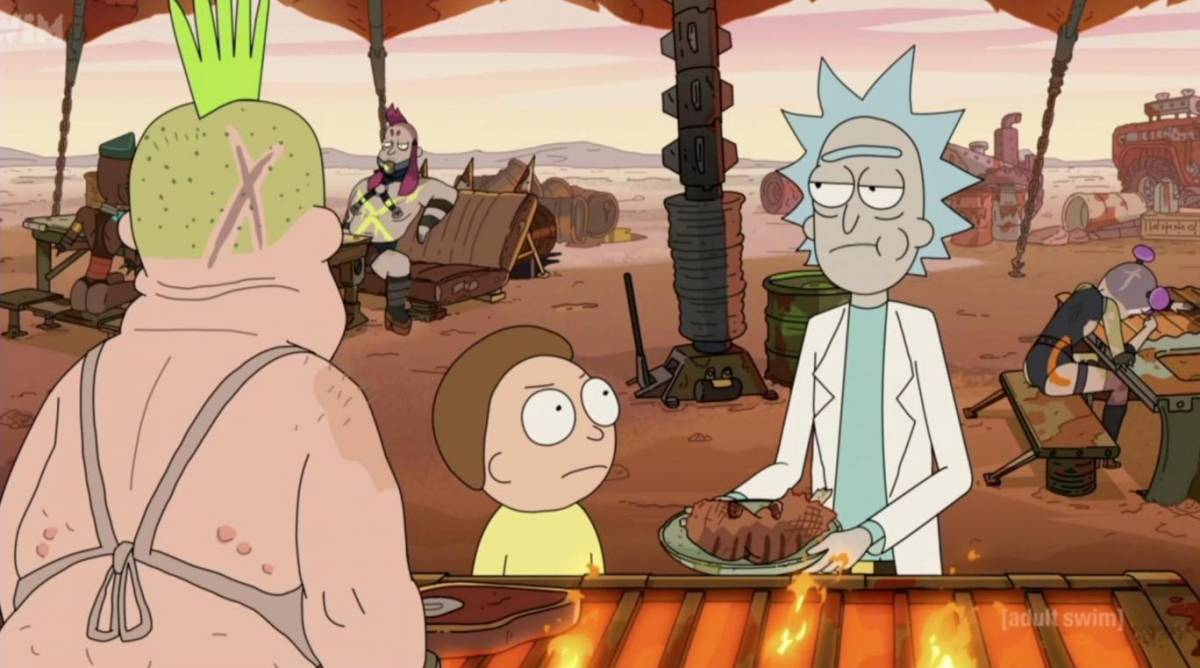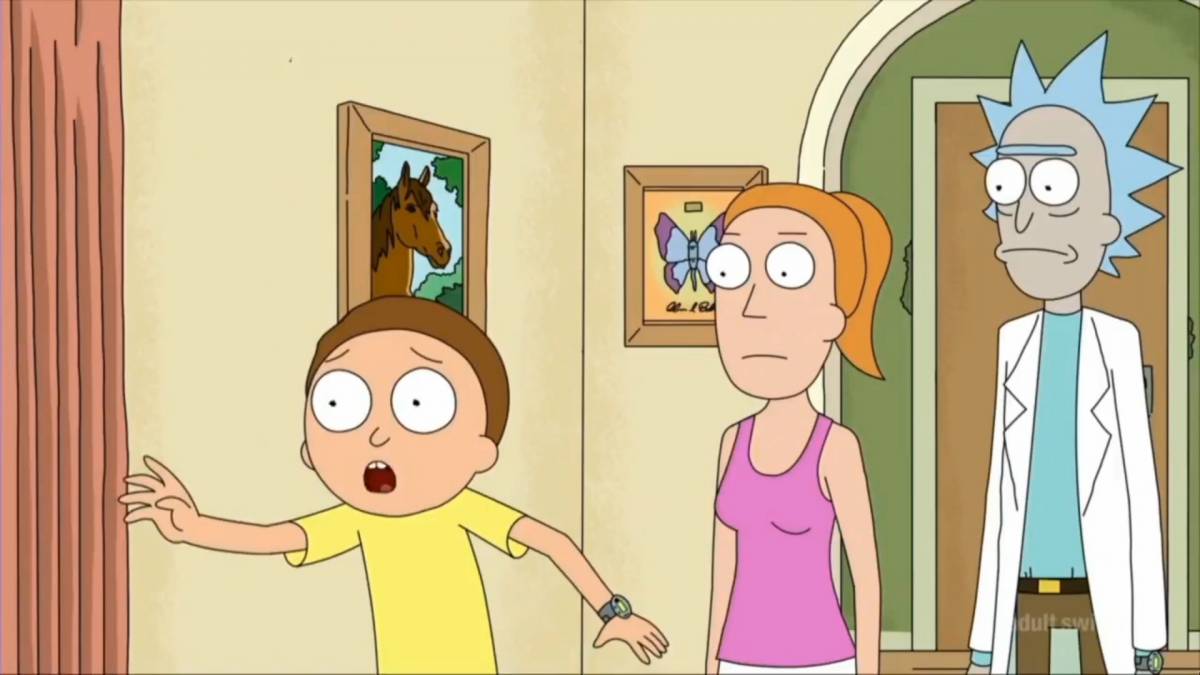The first episode of series three seems like a while ago, doesn’t it? It seems like a year and a half, or more. My theory about this idiosyncratic release schedule is that it was intended to mess with the viewers. They put out the first one on April Fool’s Day, streamed online on repeat – it’s easy to imagine a fan hovering their cursor over the link thinking ‘no way, it’ll be Rick Astley’.
The Rick and Morty guys aren’t the first to do something like this: Trey Parker and Matt Stone ended the first series of South Park on the cliffhanger of ‘Cartman’s Mom Is A Dirty Slut’, promising to reveal the identity of Cartman’s father in the second half. Instead, the next April Fool’s, the viewers were treated to Terrance and Philip’s made-for-TV movie ‘Not Without My Anus’. Parker and Stone had never actually intended to resolve the cliffhanger, only changing their minds when met with a hellstorm of fury from the fanbase.
Anyway, ‘The Rickshank Redemption’ opened with a new spin on Rick’s monologue from the pilot episode, in which after splitting up Beth and Jerry, he bade Morty, and by extension the viewers, ‘welcome to the darkest year of our adventures’. So while other critics – lesser critics, with worse hair than mine – might talk about such something-and-nothing elements as ‘jokes’ or ‘plot’, like squalling pre-literate children, I intend to meet the show on its own turf, and judge it by its own self-declared criteria, that is to say just how dark it manages to get.
So, from the off, this week we’re in a Mad Max world, or dimension, or zone (whichever one it actually is the portal gun lets people travel between). Really, though, you could judge this either way – it’s a post-apocalyptic, dystopian setting, but it’s not as if they’re taking it remotely seriously. And you could argue that the car chase-gunfights and the thunderdome are par for the course in this setting, that they are by comparison less dark here than they would be if they were taking place in, for instance, a modern-day city centre or some sort of pastoral idyll (like where the Teletubbies live). It is, for them, normal, and nothing illustrates this better than Rick casually chewing on human flesh to avoid conversation. Contrast ‘Look Who’s Purging Now’ from last series, another take on a film franchise, in which the purge night was by definition a wild departure from normality.

The episode also begins to deal with the fallout of Beth and Jerry’s divorce. This is on some level heavier material than the dieselpunk backdrop – the average viewer is far more likely to have experienced marital strife, whether personally or via friends or family, than they are to have fought in a thunderdome. And it is perhaps appropriate that even on the other side of the curtain, in the fantasy side of things, we are dealing with a situation primarily defined by the established order having been shattered.
With Rick more concerned with committing a heist, Morty and Summer are left to find different surrogate father figures, and luckily the wasteland can provide. Summer enters into a common-law marriage with the local warlord, Death-Stalker Haemorrhage, and Morty finds paternal comfort from his own arm – not a masturbation gag, rather his arm being imbued with the essence of a dead wasteland raider and seeking revenge against their killer. Interestingly, despite the running subplot of Morty descending further and further into Rick-style amorality, it is Morty who uses the experience to come to terms with the divorce, not wanting Armothy to leave him but ultimately able to accept it (and only personally killing one person in the process).
Summer, meanwhile, is perfectly happy to make a life as a death-stalker until, to her disgust, Rick uses the MacGuffinite to upgrade the society into a modern suburb. Hemorrhage becomes an apathetic couch potato, and, without the excitement of death-stalking, Summer finally agrees to leave. Rick cheerfully complies, stealing the remaining glowing green rock on the way out and leaving this world to fall back into its Mad Max state. Given Haemorrhage#s ineffectual sloth, you could see Summer’s attraction to him as evidence of an Electra complex, seeking an obvious replacement Jerry (and, indeed, making the same mistake as her mother). However, given as we’re initially introduced to him as a powerful figure who introduces them to this new world, you could make a stronger case that she sees him as a replacement Rick.
Rick himself is mainly in the Mad Max world to commit theft. The ultimate consequences of this – as mentioned, the world having awkwardly adopted modernity before being rudely returned to dog-eat-dog anarchy – are left offscreen. Do they count for less on the darkometer because of this, if the audience does not have to witness it? You could argue that Rick inflicting modernity on the world in the first place is dark in and of itself – an act of unabashed transdimensional colonialism, done entirely to satisfy Rick’s personal whims. The counterargument, that it reduces the amount of death-stalking, falls flat considering he tears it all down in the end.

Beth’s alcoholism is progressing steadily, this week reaching a point where she is unable to identify that her own children have been replaced by robots. This is partially a comedy-of-errors style necessity to uphold the new status quo, since even her huge blindspot regarding Rick might not survive full knowledge of what he gets up to. Of course, this is a self-inflicted blindspot. On some level, she simply doesn’t want to accept that her absentee father veers into the monstrous more often than not – at Bird-Person’s wedding, when he described the ‘many crimes’ they had committed, Beth chose to narcissistically focus on herself, just as she does here.
Really, the darkest material in Beth’s storyline comes with the Morty and Summer robots – both her inability to recognise them as such, and their own story arc. By the end of the episode, the Morty robot has broken his programming, and, Pinocchio-style, desperately wants to be a real boy. Sadly for him, Rick is looming in the wings with his finger on the off switch. It’s kind of an expansion of the butter-passing robot, except this time, the robots look like people, and given their apparent sentience, who’s to say that for all intents and purposes they aren’t?
As for Jerry, whenever he’s onscreen the comedy is always a matter of kicking him when he’s down, and it’s hard to see how much lower the split can bring him. Shacked up in a grotty singlesburg apartment and mugged by a stray dog, he doesn’t even seem to have the energy to descend into a mid-life crisis and sleep in a racing car, as The Simpsons’ Kirk Van Houten once did. And you could draw a good number of comparisons between Jerry and Kirk (himself a divorcee), but all told, Jerry is far closer to Family Guy’s Meg Griffin, a cosmic plaything destined to suffer. But then, these developments are nothing new – of course he’s helpless on his own, we had this in miniature when he escaped the Jerryboree. It’d be darker, or at least somewhat eerie, if things were to abruptly start going well for Jerry.
The common thread between the family’s plots is that not a lot has changed. Just as Futurama’s Fry became acclimated to the 31st century faster than even the writers could have foreseen, Beth and Jerry’s divorce has neatly slotted into the landscape – their relationship having of course been on the rocks since we first met them. And, as the show itself has told us, we’re in this for the ‘high-concept sci-fi rigmarole’, not for the same tired relationship drama plots as essentially every fictional couple. It’s entirely possible that by the end of the series Beth and Jerry’s respective neuroses will pull them back together, like an elongated, serialised version of the various episodes where they get into fights, but it’d take a miracle for them to be particularly happy about it.
In the grand scheme of animated comedy, Rick and Morty is very much a post-South Park show, particularly in terms of its use of vulgarity, which, when it crops up, is placed front and centre (and of course its corruption of the youth). Little if any material is really off-limits for them. There is always the danger of what TVTropes describes as ‘darkness-induced audience apathy’, in which the audience becomes inured to whatever is thrown at them. But they aren’t close to reaching that nadir yet. This episode must be judged in the context of what has gone before, and there is quite simply nothing that even approaches the program’s darkest moments so far, such as the nihilism of Rick and Morty burying their own broken bodies, or the existential terror of ‘Roy: A Life Well Lived’.
The darkometer, which goes from ‘puppies’ to ‘puppy Holocaust’, registers ‘Rickmancing the Stone’ as approximately on the level of ‘fatal road traffic accident’ – you wouldn’t want it to happen to you, but the fact it has happened is hardly a surprise.
Some of the coverage you find on Cultured Vultures contains affiliate links, which provide us with small commissions based on purchases made from visiting our site. We cover gaming news, movie reviews, wrestling and much more.



